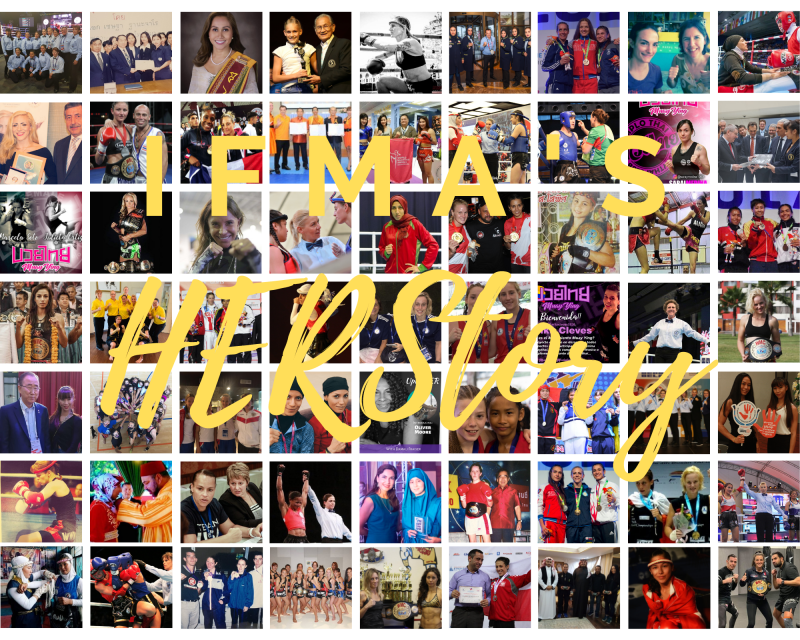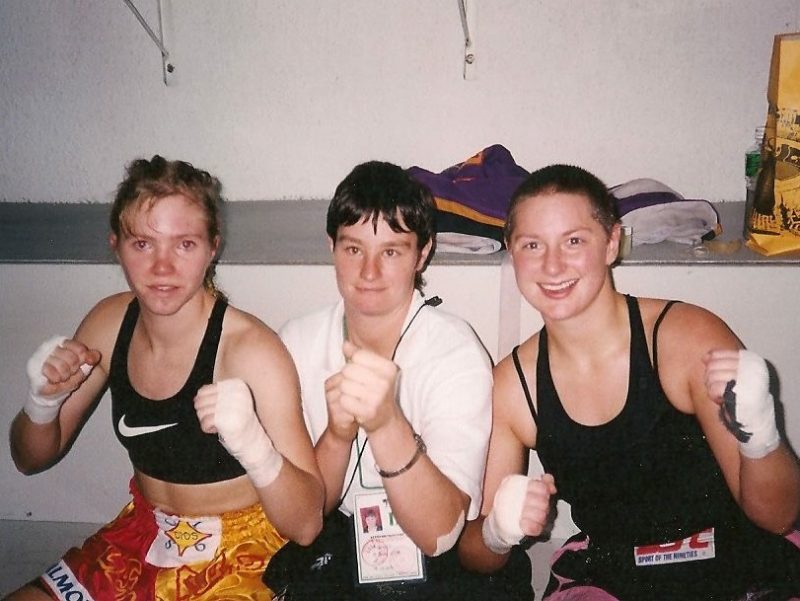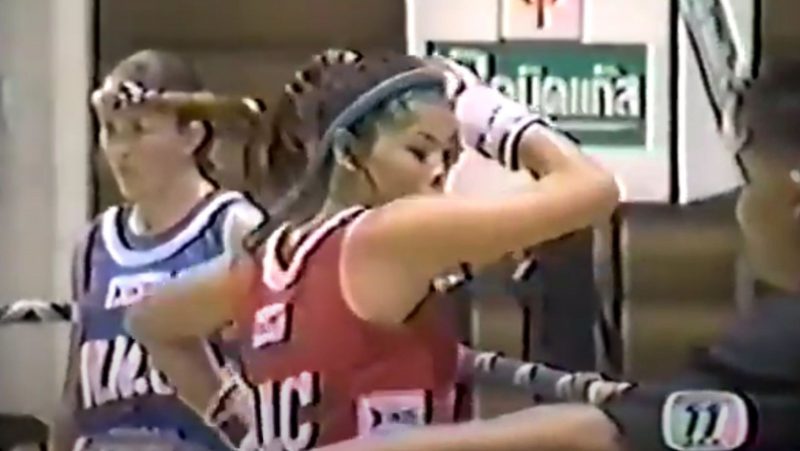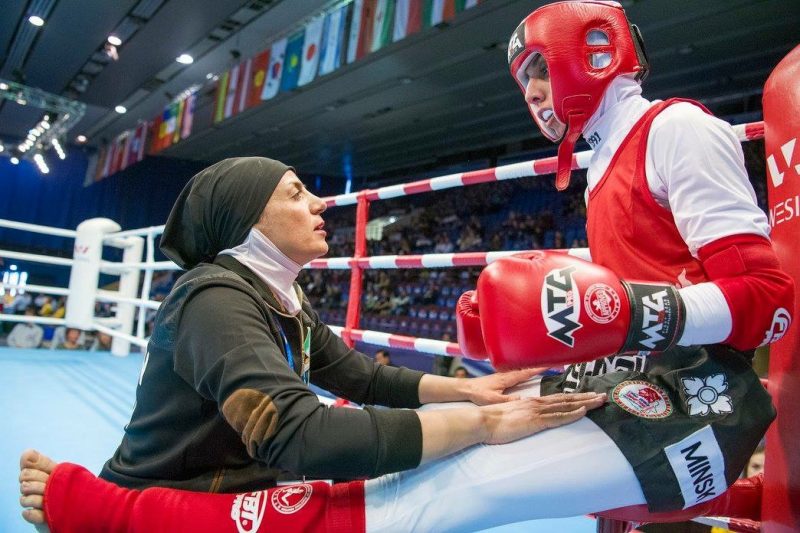Celebrating IFMA’s 20+ year HERStory of female development and the promotion of gender equality in muaythai.

Many organisations are trying to claim credit for the incredible development in female muaythai. As our older sister in muaythai, an IFMA Vice President, and one of the two female IFMA Continental Presidents, please allow me to take you all on a reflective journey back through the history of female muaythai.

After three years of researching my thesis around female muaythai I feel I am in a position to paint a solid picture of the real journey of women in muaythai, starting from the IFMA’s early beginnings in the 90’s through to today. My research included hours of sifting through archives, articles, interviews, videos, research papers, and documenting my own journey that begun in 1991. From this, I have put together an informative inquiry into the history of female muaythai.
In Thailand, in the late 80’s and until mid-90’s, female muaythai was very much unorganized, it could be said that muaythai, at this time, was purely a male sport. At this time, in Thailand, and in many other countries across the globe, women and muaythai could even be described as a contradiction in terms – an oxymoron so to speak. The well-known ‘same same but different’ would not yet describe female muaythai.

It was so extreme that even paying foreign female athletes were banned from stepping into the same ring as their male counterparts and were forced to enter separate female competition rings under the ropes at a level where they were believed to have belonged. Female coaches were not allowed to be in the corner and needless to say, female referees were taboo.
I read a story last week where another organisation has claimed the history behind the first staging of a female muaythai world title fight in Lumpinee Stadium, noting that this major breakthrough was due to their hard won and laborious work. In reality, it is a shame that it took this stadium and this organisation until 2021 to make their so-called “breakthrough.”

I remember, looking back through my journey and my first fights in Thailand, it was IFMA who made history in 1993, officially starting the development of female muaythai around the world and putting female categories in place during official competition programmes. IFMA implemented and pioneered an innovative worldwide strategy driving the ideals of gender equality in muaythai.
I count myself lucky as I was one of the first female athletes to be part of this. I shared this honour with many other forward thinking athletes from around the world. The true pioneers of female muaythai include such greats as Niamh Griffin from Ireland, Fiona Hayes from England, Amy Birch from Australia, Mapella Lehtonen, Suta & Mia from Finland, Baneko from the Ukraine, and Supapron, Dao Prasok and Rung-a-Roon from Thailand who took up the gauntlet when Thailand finally acquiesced and lifted the in place ban on female fighting.


I recall, in 1995 that the World Muaythai Council was established and it was then that IFMA and WMC joined official forces to regulate female participation and everything which goes with it from coaching, referee, medical and development in countries where females, by culture, don’t have access to the same rights as their counterparts. The WMC promoted athletes like Amy Birch making connections so she could compete in countries such as Russia, Singapore and Kazakhstan.

A young athlete who took up Muaythai at 13 years old, moving to Thailand with 22 bouts under her belt at the young age of 17 where with the support of IFMA and the WMC she continued to compete with the assistance of the IFMA and WMC availing her the opportunity to compete in ’99 on the televised internationally prestigious Kings cup against Thailand’s rising star Rung-a-Roon. These Women went on to become the first female athletes to become WMC World champions.

Nineteen ninety seven saw the official launch of the weekly Muay Ying Female competition which took place at Rangsit Stadium in Thailand. The Ban had not long been lifted on female fighters and the inevitable outburst ensued. The traditional outdated muaythai community openly attacked the IFMA and WMC for doing what is right and fair. Sadly, some of this old idea thinking still exists today. However, the IFMA/WMC stand globally united against inequality of any kind, fighting for those that do not have the power to fight for themselves. Acting against horrors that include unsafe child fighting, human trafficking, child abuse, mismatching and match fixing. Unfortunately some of these same groups still allow these things to happen but by standing united against them their influence is becoming smaller and smaller.

In 2002, another historical event took place, her royal highness Princess Siriwanwalee Nareerat, gave the official Queen’s Cup to Amy Birch from Australia, over 50 national federations attended the World Championships held in Bangkok with many sending female contingents as part of their teams. This gave rise to birth of the Queen’s Cup another step toward equality and another decision to drive the equity needed to increase the development of female muaythai around the world. Since then the Queen’s cup has become synonymous with female muaythai and is contested for year by year under the guidance of the IFMA and WMC. Female development continued to grow at an outstanding pace as many historical milestones were to follow. Female superstars were born, legends in the making were given their start in the midst of the IFMA World Championship.

In 2003, Valentina Shevchenko was the youngest ever female to win the Gold with the Privy Councillor of his Majesty of the King of Thailand travelling to Kazakhstan to preside over the ceremony. If you follow female fighting arts you will know… the rest is history.
In 2008, at the World Championships in Korea, the Islamic Republic of Iran sent the first female team which was another historical milestone and prompted the IFMA the Female Commission to research into the equity needed to ensure all female athletes of Muslim faith were able to participate at the IFMA World Championships and still be able to hold close their faith. Way before the Olympics turned the spotlight on this issue of inequality the IFMA sent females back to Iran to develop safe and inclusive rules allowing other Islamic countries to develop and bring female athletes to the World Championships. Countries such as Afghanistan, India, Malaysia, Indonesia, Morocco, Turkey, Afghanistan, Kazakhstan began to develop female athletes and create inclusiveness within their teams.
Female development was in full throttle with equal rights, opportunities and responsibilities for women as referees, coaches, managers, and leadership positions within the sport’s national governance teams. Countries like Russia and Turkey were bringing large teams and filling not all the male weight divisions but the female ones too. They understood that to win the coveted IFMA World Championship’s Top Team prize, strong skilled female athletes were the key.

Gender equality in muaythai moved from strength to strength showcasing itself on the international sporting stage at events such as The World Games and the World Combat Games. In 2010, the IFMA made history at the opening ceremony of the World Combat Games. The female superstars proudly walked in, side by side, with male superstars like Yodsanklai, Artem Levin, and Simon Marcus. And in 2017, Sofia Olofsson was voted the first World Games Female Athlete of the Year (muaythai).
The WMC and IFMA promote and develop their Champions from around the world regardless of gender. Valentina Shevchenko, Joanna Jędrzejczyk, Caley Reece, Fatima Pinto, Meriem El Moubarak, today stand equally, side by side their male counterparts. During the The World Games, European Games, Indoor Asian Games, female athletes have access to the same number of competition divisions in the official programme. Where many other combat sports still give the male athletes a greater number of competition divisions, the IFMA recognises that it has as many female athletes worldwide as it does male and it honours the equality it has created by making such significant decisions.
Muaythai prides itself on ensuring that female athletes have a career pathway to move toward and have rules that create power positions for any muaythai stakeholder that wishes to become an official. Official contributions are equal males officiate male bouts and females officiate female bouts. Many of these actions promoting inclusion and equality in muaythai has assisted the IFMA in becoming recognised by the International Olympic Committee.

IFMA has also been recognised by other international organisations for its ground breaking development in driving gender equity. Organisations such as the UN Women and UNESCO have given out awards for IFMA Gender Equality Initiatives. The development of the IFMA grassroots to elite program is exceptional. It allows the development of junior athletes, male and female, to work their way to the top. These athletes are the best of the best and are able to compete for WMC World titles or even be selected to represent their country.
This story is my perspective on how at the IFMA of our females are supported, it is an organisation where the men and women stand side by side breaking cultural barriers to fight for inclusion and gender equality. Our leaders are the IFMA and WMC Family who have fought alongside us and supported the development of female athletes and empowerment within a male dominated, traditionally masculine sport. It is because of their success that we must show respect and give credit to all those who took part in creating their idealistic vision. It is true that the IFMA would never have received recognition by the IOC if it wasn’t for the implementation and actioning of their vision into a bold and comprehensive strategic plan dating back nearly 30 years.
My final thoughts are said with a smile because when I read last week’s announcement of the “historical breakthrough for women in muaythai” and the great works the WBC has done to achieve it, I couldn’t help but chuckle quietly to myself. “Sorry folks, you are thirty years too late, that work has already been done, and let me remind you, it was not done by the WBC Muaythai!” You are a Boxing organisation that formed a muaythai subsidiary in 2005 and you are taking advantage of and taking credit for the hard work and vision of our organisation. In doing so you are taking away from so many hardworking, deserving individuals. Many IFMA and WMC members worldwide have been part of creating this opportunity and the foundation that has allowed this historical breakthrough to occur.

By: Sue Glassey
IFMA Vice President, Chair of Gender Equality Commission
and Former World Champion
